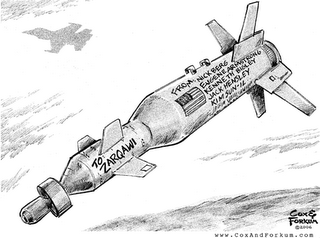El analisis de los ultimos mensajes de Bin laden: suenan como una advertencia
Media and officials regularly introduce Al Qaeda as a terrorist network whose organization follows strict hierarchical rules. Like a pyramid, Al Qaeda would be a well-organized and coherent group having one supreme chief (Bin Laden), some lieutenants (Zawahiri, Zarqawi...) and various affiliated groups throughout the world that recruit, train and attack.
If one didn't hear a lot on behalf of Bin Laden in 2005, one may say now that 2006 is a year that Bin Laden has chosen to talk publicly through frequent audiotapes or internet statements. Some officials believed he was dead given he made almost no appearance for months and... suddenly here he is saying that Zarqawi was a great defender of Islam and that he along with his closest followers has decided to appoint a successor, Abu Hamza al-Muhajir, to lead what's named "Al Qaeda in Iraq". What does all this mean ?
Two possible interpretations:
First, many analysts said last year that Bin Laden was progressively losing control of his "organization" and that Zarqawi may appear as the "new Bin Laden". Thus Bin Laden would have been prone to reaffirm his status of leader. Just a power-related strategy to say "hey! I am still the leader and I don't want to be overshadowed". In addition to power's argument, Bin Laden could have coherence as a purpose. A coherence that he would think it's better for Al Qaeda's efficiency, to fix priorities worlwide and to create the essential mainstream to make the whole muslim world take on the West (the djihad).
But the analyst or the intelligence expert must be careful. Such a "coherence" may result from the overall introduction that media and officials do of all this pieces of information. It can be due to the Media that one can think Al Qaeda acts like a coherent and hierarchical network appointing its new chief like a company appoints a new executive for a specific sector or position.
However it can't really work this way, otherwise Al Qaeda would have been completely dismantled for years. Reality seems far more difficult to understand for western cultures as Al Qaeda tries to back up this idea that Al Qaeda works like a western company or a military unit does. For efficiency's purpose, it's impossible. And what makes the GWOT so complex is that Al Qaeda acts like a (Lernean) Hydra with several heads and sleeper cells. If Bin Laden wants the West to envisage Al Qaeda as a coherent system, he succeeds. But he knows that he does a strategical use of it with a view to distracting media and counterrorist officials' attention. It's a warning.
Second, Al Qaeda may be endangered by recent improvements in GWOT and the stubborn hunt of western Special Forces in Afghanistan and everywhere else. This growing danger incites Bin Laden to unify its "terrorist activities" so as to multiply the crisis spots and sensitive situations so as counterterrorist forces to be busy enough somewhere else instead of concentrating all their efforts on him.
Zarqawi, the terrorist who couldn't be found (many media repeated this for years, some even dared to say he never existed), has been killed. And beyond all considerations, this has shown to Al Qaeda that nobody (even Bin Laden) is shielded from worlwide counterrorist efforts deployed since 9/11. As a result, Bin Laden wants to intensify the "jihad" before it's too late, before it's too late for him to see the West (and especially the United States) destroyed in "the flames of hell".
Sure Bin Laden can be replaced. But it's unsure that Bin Laden wants to die without reaching his objectives. All these audiotapes and statements sound like a warning saying: A huge attack against the West is (may be) on the way.



